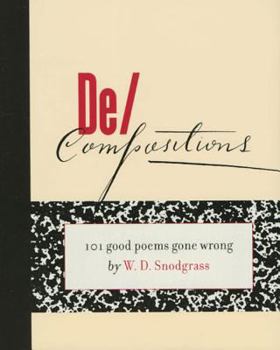De/Compositions: 101 Good Poems Gone Wrong
Select Format
Select Condition 
Book Overview
This original, illuminating, and sometimes quite funny poetry anthology is primarily concerned with a fundamental and familiar question: How can we tell good poetry from bad? To illustrate precisely... This description may be from another edition of this product.
Format:Paperback
Language:English
ISBN:1555973175
ISBN13:9781555973179
Release Date:June 2001
Publisher:Graywolf Press
Length:312 Pages
Weight:0.90 lbs.
Dimensions:0.8" x 6.5" x 8.0"
Customer Reviews
4 ratings
A great new way of studying poetry
Published by Thriftbooks.com User , 15 years ago
In this book, Snodgrass rewrites ("decomposes") many well-known poems by famous poets. The trick is that he sets out to make them worse, to make the language snag where it should flow, to make the ideas general when they should be specific, and so forth. The result is humorous but also highly instructive. It's easy to enjoy some of the original versions of these poems (which are set alongside Snodgrass's decompositions for easy comparison), but it's sometimes hard to see why they're so good. Snodgrass's deliberately botched versions highlight the mistakes that the original poets didn't make, and the brilliance and clarity of the original lines leaps into much sharper focus as a result. The next time I teach an introductory poetry class, I intend to use this book with my students for this very reason. The book is divided into sections, each section followed by a brief commentary. You generally get each section's "point" after a handful of poems, though, and I think this book could have been substantially shorter, or included a bit more commentary and a bit fewer decomposed poems. Better too much of a good thing than too little, though, and I highly recommend this book.
A review of de/composed poetry
Published by Thriftbooks.com User , 19 years ago
What you get with this book is an instructive education into the art of poetrycraft. Snodgrass has taken poems written by authors from Emily Dickinson to William Shakespeare and rewritten their work, essential removing the creative spark from these poems and making them dull and lifeless. In so doing, Snodgrass educates as to what makes the original shine. As an example, Snodgrass takes the first stanza of William Blake's "The Tyger" and rewrites it (or, to use Snodgrass' expression "de/composes" it) from the usual striking variance of its original meter: Tyger! Tyger! burning bright In the forests of the night, What immortal hand or eye, Could frame thy fearful symmetry? and into strict iambics: O tyger, beast that burns so bring In darkling forests of the night, What godlike hand, what deathless eye Dare frame thy fearful symmetry? and then into anapests: O tyger, you creature that's burning so bright. In the threatening, darkening forests of night, What hand of immortal, what diety's eye Dare hope it could fashion thy feared symmetry? In so doing, Snodgrass retains the original intent of the poet, but reveals how important word choice, rhythm, voice and meter and structure are to the poet. A masterful piece of work that teaches without being "teachy." I highly recommend it!
A must-have title for any poet.
Published by Thriftbooks.com User , 19 years ago
W. D. Snodgrass, De/Compositions: 101 Good Poems Gone Bad (Graywolf Press, 2001) I figured, when I put this on reserve at the library, that Snodgrass was going to take poems from otherwise excellent (or, in some cases, overrated; it's about time a serious critic finally takes Emily Dickinson to task for every one of her poems being able to be sung to the tune of "The Yellow Rose of Texas") poets and breaking down what went wrong in them. I was wrong, and what I got was far finer: Snodgrass rewrites 101 poems, taking out the things that make them brilliant and turning them into everything from mediocre sludge to hysterically bad self-parody. In doing so, he highlights what is so wonderful about so many excellent poems better than thousands of pages of explication could; two or three pages of explication at the end of each section is included for clarity and closing notes, to highlight a change or two, but otherwise, Snodgrass lets the poems and their deconstructions (also, the occasional rough draft from the original poet) speak for themselves. I cannot overstate the importance of this book for the working poet. It should be required reading for everyone who's ever written a poem with any pretense to greatness, and for most, it should be on the short shelf of sacred reference books to which the poet will turn hundreds, maybe thousands, of times over the course of his career. No finer book on (or of) poetry crossed my desk this year; very few finer have ever crossed it. It makes my top five books of the year. *****
Enlightenment by way of evisceration
Published by Thriftbooks.com User , 22 years ago
What a wonderful resource for students of poetry--whether discovering Dickinson for the first time, completing an MFA, or holding a Ph.D in literature and a full professorship. Snodgrass takes some of the most powerful poems in the English language, and eviscerates them. We are often left with hilariously or shamefully dull, clunky verse, that shows by negative example just what made the original so great.This is not only a text for use in poetry classes, although the 101 "de/composed" poems are taken from Snodgrass's own work as a teacher. There's plenty of knowledge available to the casual reader in comparing the two versions of each poem and reading the accompanying discussion. That itself is a pleasure to read, direct, lucid, insightful, and often humorous. A definite five stars!





